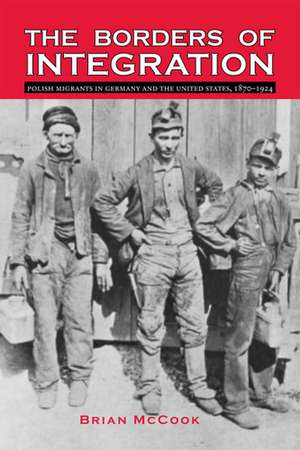The Borders of Integration: Polish Migrants in Germany and the United States, 1870–1924: Polish and Polish American Studies
Autor Brian McCooken Limba Engleză Paperback – 12 apr 2011
The issues of immigration and integration are at the forefront of contemporary politics. Yet debates over foreign workers and the desirability of their incorporation into European and American societies too often are discussed without a sense of history. McCook’s examination questions static assumptions about race and white immigrant assimilation a hundred years ago, highlighting how the Polish immigrant experience is relevant to present-day immigration debates on both sides of the Atlantic. Further, his research shows the complexity of attitudes toward immigration in Germany and the United States, challenging historical myths surrounding German national identity and the American “melting pot.”
In a comparative study of Polish migrants who settled in the Ruhr Valley and northeastern Pennsylvania, McCook shows that in both regions, Poles become active citizens within their host societies through engagement in social conflict within the public sphere to defend their ethnic, class, gender, and religious interests. While adapting to the Ruhr and northeastern Pennsylvania, Poles simultaneously retained strong bonds with Poland, through remittances, the exchange of letters, newspapers, and frequent return migration. In this analysis of migration in a globalizing world, McCook highlights the multifaceted ways in which immigrants integrate into society, focusing in particular on how Poles created and utilized transnational spaces to mobilize and attain authentic and more permanent identities grounded in newer broadly conceived notions of citizenship.
In a comparative study of Polish migrants who settled in the Ruhr Valley and northeastern Pennsylvania, McCook shows that in both regions, Poles become active citizens within their host societies through engagement in social conflict within the public sphere to defend their ethnic, class, gender, and religious interests. While adapting to the Ruhr and northeastern Pennsylvania, Poles simultaneously retained strong bonds with Poland, through remittances, the exchange of letters, newspapers, and frequent return migration. In this analysis of migration in a globalizing world, McCook highlights the multifaceted ways in which immigrants integrate into society, focusing in particular on how Poles created and utilized transnational spaces to mobilize and attain authentic and more permanent identities grounded in newer broadly conceived notions of citizenship.
| Toate formatele și edițiile | Preț | Express |
|---|---|---|
| Paperback (1) | 260.45 lei 6-8 săpt. | |
| Ohio University Press – 12 apr 2011 | 260.45 lei 6-8 săpt. | |
| Hardback (1) | 434.16 lei 6-8 săpt. | |
| Ohio University Press – 12 apr 2011 | 434.16 lei 6-8 săpt. |
Preț: 260.45 lei
Nou
Puncte Express: 391
Preț estimativ în valută:
49.84€ • 52.18$ • 41.34£
49.84€ • 52.18$ • 41.34£
Carte tipărită la comandă
Livrare economică 09-23 aprilie
Preluare comenzi: 021 569.72.76
Specificații
ISBN-13: 9780821419267
ISBN-10: 0821419269
Pagini: 296
Ilustrații: illus.
Dimensiuni: 152 x 229 x 20 mm
Greutate: 0.41 kg
Ediția:1
Editura: Ohio University Press
Colecția Ohio University Press
Seria Polish and Polish American Studies
ISBN-10: 0821419269
Pagini: 296
Ilustrații: illus.
Dimensiuni: 152 x 229 x 20 mm
Greutate: 0.41 kg
Ediția:1
Editura: Ohio University Press
Colecția Ohio University Press
Seria Polish and Polish American Studies
Recenzii
“McCook offers an insightful comparative study that carefully situates in time Polish immigrant communities in the Ruhr valley and in Pennsylvania and demonstrates well their social and political evolution. He makes a strong case for the modern relevance of the Polish experience in discussion of immigration and government policy today.”—The Journal of American History
“The Borders of Integration offers a welcome new approach to migration and labor history. The analysis rests on comparison and leads up to concrete suggestions for contemporary policies of integration, based on the divergent rates of return migration in post-World War I Westphalia and Pennsylvania.” —Nations and Nationalism
“McCook renders his complex material with a graceful clarity that makes this work a pleasure to read. Summing Up: Highly recommended. All levels/libraries.”—Choice
“McCook has produced a formidable piece of comparative history…. Present debates about immigration are often uninformed by historical examples and lacking in explanations regarding the mechanism by which integration works. As such, McCook’s Borders of Integration should be welcomed by those scholars who wish to engage seriously and soberly in the hot-button debates of assimilation and multiculturalism in present-day America and Germany.”—German Studies Review
“McCook has updated existing ethnic studies by demonstrating that comparative studies of the factors shaping the complex integration process help us to better understand the immigrant experience. Scholars should follow his call for using this approach to evaluate recent and current migration trends.”—Yearbook of German-American Studies
Notă biografică
Brian McCook is a senior lecturer in history and politics at Leeds Metropolitan University. He is the recipient of fellowships from the Alexander von Humboldt Foundation, the Social Science Research Council, the German Historical Institute, the Kosciuszko Foundation, and the Woodrow Wilson Center.
Descriere
A comparative study of Polish migrants in the Ruhr Valley and in northeastern Pennsylvania, The Borders of Integration questions assumptions about race and white immigrant assimilation a hundred years ago, highlighting how the Polish immigrant experience is relevant to present-day immigration debates.






















